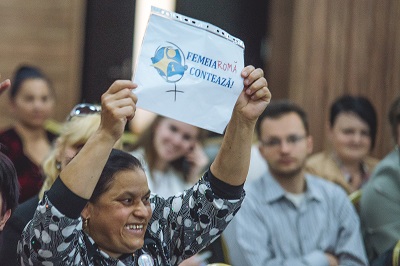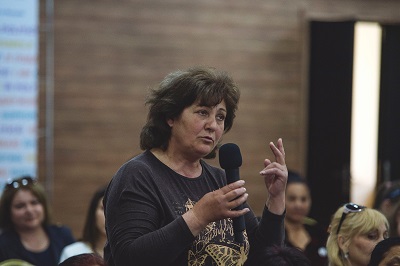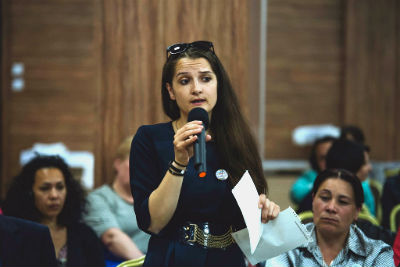Blazing trails, first Roma women elected to local council in Moldova
Overcoming barriers on account of both gender and ethnicity, two ethnic Roma women ran for local office for the first time - and won - after receiving campaign training supported by UN Women.Date:
For the first time since the Republic of Moldova gained independence in 1991, two Roma women were recently elected to town councils. They were among 15 Roma, seven of them women, who ran in local elections held on 14 June 2015. Previously, no Roma woman had ever run for local office in Moldova.

One of the elected women is Varvara Duminica, 54, who worked for two years as a Romani community mediator in Chetrosu, a village in Drochia district, 150 kilometres north of Chisinau, Moldova’s capital. The second, Laura Bosnea, 28, was elected local councillor in Rascani, a town 166 kilometres north of Chisinau.
Also the youngest local candidate elected, Ms. Bosnea recalls the multiple and intersecting challenges she faced on account of her gender, age and ethnicity. “Some of the acting political party members declared in public that there is no need for Romani women in politics and we, Romani women, should stay at home and take care of children or go sell clothes at the bazaar,” she said.
Ms. Duminica said some of the requirements for holding local office created barriers for women candidates, as they were expected to resign from paid employment, including as community mediators, which provides many Roma women with a meager, but essential, income of USD 80 per month. And local councillor salaries are even lower.

A 2014 UNDP study on the situation of Romani women and girls in Republic of Moldova shows that women across the country still face discrimination and inequality in social, economic and political life. Roma women have been virtually excluded from representation in public life, and their involvement in decision-making remains below international benchmarks. According to the Women in Politics 2015 map by UN Women and the Inter-Parliamentary Union, Moldova ranks in 64th place in female representation in Parliament, with women holding 20.8 per cent of seats in the lower house.
UN Women works with the Government of Moldova and civil society to promote women’s voting rights and increase their political representation.
Ms. Duminica and Ms. Bosnea credit their past community work as well as pre-election campaign training seminars organized by the Romani Women and Girls Network (RWGN), supported by UN Women, for motivating them to run and for making their election possible.

I thought it would be difficult to run for local council, but with the support of the community where I was a mediator, and encouragement by the UN programme “Women in Politics” (WIP), it was much easier than I expected,” said Ms. Bosnea.
Funded by the Government of Sweden, WIP is a joint UN Women-UNDP programme that aims to increase women’s participation in politics and decision-making. WIP helps train local and national female political candidates, including Roma women and those with disabilities, and works with communities to promote the nomination of women candidates. It also provides capacity building support for elected women, including individual coaching on diction, public image and how to incorporate gender equality in their work as MPs. New local councillors also join a mentoring programme that includes training on problem-solving, budgeting and fundraising.
Ms. Bosnea and Ms. Duminica see their election as an opportunity to develop their communities and build their country’s future. They emphasized the importance of raising awareness around gender equality at the local level, especially among Roma communities, and that getting more women involved in decision-making processes would improve life for all Moldovans.
Both women plan to focus on educating youth and involving Roma women and men more actively in the community’s social, cultural, economic and political life.
“Educating young people and ensuring a decent living for our children are the keys to becoming a developed country,” argued Ms. Duminica, who will work to set up a recreation centre for young women and men, a cultural centre for the elderly, a sewage system and better roads in her village. “Obviously, it is a huge achievement that two Romani women are now in City Hall, but still we need to struggle in order to remain in our places for our full four-year mandate.